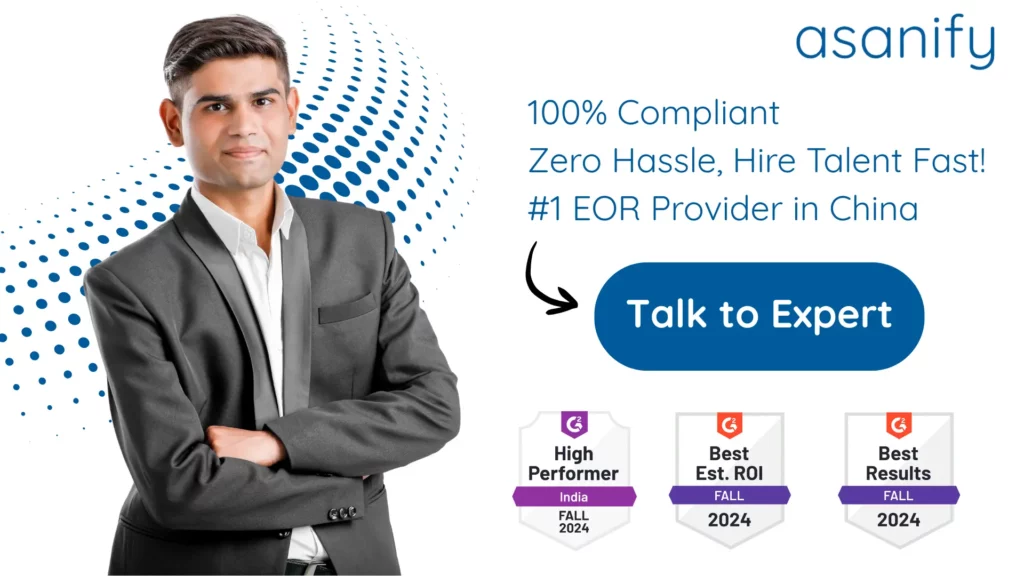As China continues to play a central role in global manufacturing, technology, and R&D, international and domestic companies alike are increasingly leveraging staffing agencies to meet evolving workforce needs. With strict regulatory oversight, regional labor law variations, and a fast-paced hiring environment, staffing agencies in China offer vital support for compliant, agile, and localized hiring. In 2025, these agencies help businesses scale across Tier 1, Tier 2, and emerging cities while managing administrative and legal complexities.
Staffing solutions are particularly valuable for industries facing talent shortages, aggressive expansion goals, or complex compliance landscapes. By outsourcing workforce management functions to experienced local firms, companies gain speed, precision, and peace of mind—without the risks associated with direct hiring. This guide breaks down everything you need to know about staffing agencies in China. From common roles filled and hiring models to the top providers and why global companies are choosing EOR solutions like Asanify, this blog equips you to make smarter hiring decisions in China’s complex labor market.
Table of Contents
- What Does a Staffing Agency Do and When Should You Use One?
- Common Roles Chinese Staffing Firms Fill Across Industries
- Why Staffing Partnerships Give Companies a Competitive Hiring Edge in China
- Staffing, Recruiting, and EOR: Which Hiring Model Fits Your Business?
- Hiring Models Used by Chinese Staffing Providers
- The 10 Leading Staffing Agencies in China in 2025
- Detailed Comparison of Top 10 Staffing Agencies in China
- Which Chinese Cities Are Leading in Staffing Demand?
- How to Select the Right Staffing Partner for Your Hiring Needs
- Why Global Employers Choose Asanify for Seamless Hiring in China
- FAQs
What Does a Staffing Agency Do and When Should You Use One?
A staffing agency in China acts as a bridge between employers and workers, helping source, onboard, and manage talent for short-term projects, long-term contracts, or permanent roles. These agencies often take responsibility for labor contracts, payroll, social insurance contributions, tax filings, and local regulatory compliance. Many also offer training, performance tracking, and conversion-to-hire support.
You should consider a staffing agency when:
- You need to hire talent quickly across different provinces or cities
- Your business lacks local HR, legal, or payroll infrastructure
- You want to minimize employment risks or probationary hiring costs
- You plan to hire without establishing a local legal entity
- You require flexible contracts for seasonal or project-based work
- You aim to test candidates before committing to permanent employment
Common Roles Chinese Staffing Firms Fill Across Industries
- Technology: Software developers, data engineers, QA testers, network administrators, DevOps engineers, UI/UX designers, cybersecurity analysts
- Manufacturing & Supply Chain: Assembly line workers, quality inspectors, CNC operators, procurement specialists, logistics coordinators
- Finance & Accounting: Tax analysts, auditors, controllers, AP/AR specialists, treasury managers, bookkeepers
- Customer Support & BPO: Call center agents, technical support staff, bilingual service reps, helpdesk technicians, data entry clerks
- Healthcare & Life Sciences: R&D scientists, lab technicians, regulatory affairs managers, clinical trial coordinators, medical sales reps
- Sales & Marketing: Territory sales reps, e-commerce managers, digital marketers, brand consultants, content strategists
- Administrative Roles: HR assistants, admin executives, office coordinators, receptionists, executive secretaries
Why Staffing Partnerships Give Chinese Companies a Competitive Hiring Edge
Partnering with a staffing agency in China provides numerous strategic advantages, especially in a market known for its complex employment laws, regional variations, and fast-paced hiring demands. These agencies help companies reduce administrative burdens while ensuring legal compliance and operational agility. Here’s how:
Access Pre-Vetted Talent
Staffing agencies in China maintain robust talent databases that are categorized by job function, seniority level, location, industry domain, and even language skills (Mandarin, Cantonese, English, and more). This granular segmentation ensures that clients can quickly access talent with the exact qualifications they need. Agencies often pre-screen candidates based on technical skills, cultural fit, and legal eligibility, saving HR teams hours—or even days—of manual sourcing and evaluation.
Accelerate Hiring
China’s labor market is highly competitive, especially in Tier 1 cities like Beijing, Shanghai, and Shenzhen. Staffing partners expedite hiring by using pre-qualified pipelines and streamlined internal processes. Many firms can deliver shortlist candidates within 48–72 hours, making them ideal partners for urgent project hires, backfill needs, or product launch teams. This speed is critical in industries like e-commerce, logistics, and R&D where timing directly impacts revenue.
Ensure Compliance
Chinese employment law requires careful navigation through contributions to the social insurance system (社保), the housing provident fund (公积金), and individual income tax (IIT), all of which vary by city and employment type. Staffing firms help ensure every employee is enrolled in the correct benefit scheme, contracts align with the PRC Labor Law, and documentation is maintained for audits. Some agencies also support dual-language contracts, probation terms, and performance-based incentive structures, all while adhering to local statutory rules.
Scale Flexibly
China’s economic environment often requires companies to rapidly expand or contract their workforce based on product cycles, government policy shifts, or seasonality. Staffing agencies enable businesses to scale headcount up or down without the legal risk or severance obligations that come with permanent hiring. This is especially valuable for industries such as manufacturing, retail, and tech, where demand volatility is high. Agencies can also provide project-based teams (e.g., software developers or warehouse staff) that operate under flexible durations.
Control Costs
Many staffing firms offer transparent fee models—flat monthly charges, hourly rates, or per-hire pricing—making it easier to predict and allocate human capital budgets. They also help companies avoid hidden costs associated with payroll errors, incorrect tax withholdings, late statutory payments, or worker misclassification. For global companies unfamiliar with Chinese HR practices, this cost clarity is crucial to avoid regulatory penalties or cash flow disruptions.
Gain Local Insights
Beyond talent and logistics, staffing agencies in China offer critical market intelligence. They provide up-to-date data on salary trends, job market competitiveness, benefit expectations, and local labor supply. This can help companies shape competitive compensation packages, choose the best cities for expansion, and make informed decisions around hybrid or remote workforce strategies. For example, an agency might recommend sourcing customer support staff from Chengdu instead of Beijing to reduce costs while maintaining service quality.

Staffing, Recruiting, and EOR: Which Hiring Model Fits Your Business?
Choosing the right hiring model in China depends on your business structure, long-term goals, and compliance readiness. While staffing offers flexibility for short-term needs, recruiting supports permanent in-house growth, and Employer of Record (EOR) services are ideal for foreign companies without a local legal entity. Understanding the differences helps ensure faster, risk-free expansion into the Chinese market.
| Model | Best For | Key Characteristics |
| Staffing | Short-term, contract, and project work | Agency is legal employer; handles all HR, payroll, and compliance |
| Recruiting | Direct permanent hires | Agency sources talent; your company hires and manages them directly |
| EOR | Foreign companies without Chinese entity | EOR becomes legal employer; manages full employment compliance |
Hiring Models Used by Chinese Staffing Providers
Staffing providers in China offer a range of hiring models to meet the diverse needs of domestic and international companies. These models vary in terms of employment responsibility, cost structure, scalability, and legal risk. Understanding these options can help businesses select the most effective and compliant workforce strategy based on their goals, sector, and internal HR capacity.
1. Temporary (Contingent) Staffing
This is one of the most popular models among Chinese staffing agencies. Under this arrangement, the staffing agency acts as the legal employer of the worker, handling labor contracts, payroll, tax withholdings, social insurance contributions, and compliance with local labor laws. The employee is then assigned to the client company for a fixed or flexible duration.
Use Cases:
- Seasonal workload peaks in manufacturing or logistics
- Short-term project execution in sectors like retail or hospitality
- Quick backfills during leaves or absences
- Event staffing or administrative surge requirements
Benefits:
- Eliminates the need for direct employment contracts
- Enables rapid onboarding and offboarding
- Reduces long-term liabilities and severance risks
- Provides flexibility in workforce management during market uncertainty
2. Contract-to-Hire
In this hybrid model, the employee is initially employed by the staffing agency and works on a contract basis. After a trial period—typically 3 to 6 months—the client company has the option to transition the worker into a full-time role based on performance, budget, and fit.
Use Cases:
- Evaluating cultural or technical fit for strategic roles
- Hiring specialized tech, finance, or engineering professionals with minimal commitment
- Avoiding bad hires by testing on-the-job performance before formal onboarding
Benefits:
- Mitigates the risk of poor hiring decisions
- Offers flexibility to adjust hiring plans based on evolving business needs
- Saves costs associated with permanent headcount until conversion is justified
- Often includes pre-negotiated conversion terms to simplify transitions
3. Direct Hire
With direct hire (also called permanent recruitment), the staffing agency sources, screens, and shortlists qualified candidates, but the hiring company directly employs the selected individual. This model is ideal for roles requiring domain expertise, leadership experience, or long-term strategic alignment.
Use Cases:
- Mid-to-senior level leadership hiring (e.g., Finance Director, Engineering Lead)
- High-impact individual contributor roles like Product Managers, Legal Advisors
- Expansion into new Chinese cities or regions requiring local experts
Benefits:
- Access to specialized recruiters with market knowledge and candidate networks
- Streamlined hiring cycles via targeted sourcing and screening
- Enhanced candidate quality and retention potential
- Scalable model for long-term talent acquisition without staffing agency mark-ups post-hire
4. Managed Services (Outsourced Teams)
This model involves the staffing agency not just supplying workers, but fully managing a deployed team under a service-level agreement (SLA). It includes operational oversight, workforce scheduling, attendance tracking, payroll, legal compliance, and sometimes even performance management.
Use Cases:
- Running outsourced IT support, R&D, or tele-sales teams
- Operating warehouse or logistics operations across multiple Chinese regions
- Managing customer service or BPO centers for local and cross-border clients
- Supporting compliance-heavy industries like healthcare or banking through third-party teams
Benefits:
Ideal for organizations looking to enter China without building an internal operations unit
Reduces management overhead for internal teams
Allows businesses to focus on core activities while maintaining high-quality service delivery
Enhances compliance with Chinese labor regulations via a single service provider
Suggested Read: Understanding Labour Laws in China: Contracts, Wages, and Termination Rules
The 10 Leading Staffing Agencies in China in 2025
Navigating China’s complex labor regulations and talent market requires trusted staffing partners with deep local expertise. Below are ten of the most reputable staffing agencies in China for 2025, offering services ranging from temporary staffing and direct hire to full-service Employer of Record (EOR) support for foreign companies.
- Asanify
- FESCO Group
- CIIC (China International Intellectech Corporation)
- Randstad China
- ManpowerGroup China
- Hays China
- Adecco China
- 51job Staffing
- Liepin Group
- CDP Group
1. Asanify
Asanify is a global Employer of Record (EOR) and staffing provider that helps international companies hire in China without establishing a legal entity. It handles everything from compliant contracts to local payroll, IIT (Individual Income Tax), social security, and housing fund contributions. Asanify is ideal for remote, hybrid, or distributed workforce expansion.
Key Features:
- Full-service EOR and staffing model
- Rapid onboarding within 1–2 weeks
- Manages payroll, 社保, 公积金, and IIT
- Dual-language contract support
- Localized HR with global dashboard visibility
2. FESCO Group (Foreign Enterprise Service Corporation)
FESCO is one of the oldest and most reputable HR and staffing firms in China. Founded in 1979, it has strong government affiliations and provides staffing, outsourcing, and compliance services for domestic and multinational firms, particularly in Tier 1 cities.
Key Features:
- Vast experience and government backing
- Specialized in social insurance and benefits processing
- Large-scale workforce management
- Strong presence in Beijing and eastern China
3. CIIC (China International Intellectech Corporation)
CIIC is a state-owned enterprise and one of China’s largest human resource service companies. It offers employment outsourcing, payroll processing, and labor dispatch services for both foreign-invested and local enterprises.
Key Features:
- Nationwide coverage across 300+ cities
- Government-aligned compliance and labor support
- High-volume staffing across industrial and service sectors
- Robust expertise in PRC labor law
4. Randstad China
Randstad is a global staffing leader with strong local operations in China, especially in Shanghai, Suzhou, and Beijing. It serves both MNCs and SMEs, specializing in recruitment for finance, manufacturing, IT, and professional services.
Key Features:
- Multilingual recruitment teams
- Talent solutions for mid-to-senior roles
- Contract staffing and payrolling services
- HR consulting and workforce planning support

5. ManpowerGroup China
Operating in China for over 25 years, ManpowerGroup offers staffing, recruitment process outsourcing (RPO), talent mapping, and HR compliance services. It has deep expertise in technology, manufacturing, and shared services hiring.
Key Features:
- Strong employer branding and RPO capability
- Quick deployment of white-collar talent
- Labor dispatch and outsourcing licenses
- Broad candidate database in Tier 1 and Tier 2 cities
6. Hays China
Hays focuses on white-collar, professional roles in sectors like banking, IT, life sciences, and engineering. Known for its deep market research and candidate quality, Hays offers permanent, contract, and executive search services.
Key Features:
- Specialist recruitment consultants
- Data-driven hiring recommendations
- Strong in financial services, pharma, and legal staffing
- International recruitment standards with local reach
7. Adecco China
Part of the global Adecco Group, Adecco China offers end-to-end HR solutions including staffing, payrolling, and workforce transformation. It supports both large enterprises and startups with compliance-ready hiring models.
Key Features:
- Nationwide reach with 60+ offices
- Integrated HR tech platform
- Employer branding and onboarding tools
- Social insurance and tax handling
8. 51job Staffing (前程无忧)
51job is one of China’s largest online recruitment platforms, and its staffing division provides temp hiring, payroll outsourcing, and on-site workforce management. It’s popular among fast-growing firms and BPOs.
Key Features:
- Strong sourcing pipeline from 51job job board
- Efficient temp and part-time staff deployment
- Tech-enabled payroll and benefits admin
- Flexible pricing for SMEs and high-volume employers
9. Liepin Group (猎聘)
Liepin is a high-end job platform that also offers tailored recruitment and HR outsourcing services. It is known for serving China’s executive and senior management segments.
Key Features:
- Executive search and C-level placement
- Data-driven talent insights
- White-glove recruitment service
- Strategic workforce planning
10. CDP Group
CDP is a digital HR and payroll outsourcing provider serving China and the broader Asia-Pacific region. It supports multinational clients with EOR, HR tech solutions, workforce compliance, and people analytics.
Key Features:
- Advanced HR SaaS platform
- Expertise in multi-city payroll compliance
- Multinational and cross-border employment models
- Strong in digital transformation and data security
Detailed Comparison of Top 10 Staffing Agencies in China
With each agency offering different strengths—from executive search to high-volume workforce deployment and EOR capabilities—it’s important to compare providers based on your business needs. The table below outlines how China’s top staffing agencies stack up in terms of service scope, specialization, compliance coverage, and regional presence.
| Agency | Specialization | EOR Support | Coverage Areas | Industries Served |
| Asanify | EOR + Staffing for SMEs/MNCs | Yes | Nationwide + Cross-border | Tech, Finance, BPO |
| FESCO Group | Payroll & HR Outsourcing | No | All major provinces | Government, Admin, Manufacturing |
| CIIC | Labor Dispatch + Payroll | No | Beijing, Shanghai, Tier 1-2 | Engineering, Public Sector, Industrial |
| Randstad China | Multinational Talent Search | No | Major business hubs | Sales, Office, Operations |
| ManpowerGroup China | Workforce Solutions | No | Nationwide | Blue/white-collar, Retail, Tech |
| Hays China | Executive Search | No | Shanghai, Shenzhen, Beijing | Finance, Legal, Technology |
| Adecco China | General Staffing + Outsourcing | No | National + regional | Light Industrial, Office Admin |
| 51job Staffing | Digital Job Platform | No | Online + Metro areas | Tech, Digital, E-commerce |
| Liepin Group | Mid to Senior-Level Search | No | Tier 1 and 2 cities | Finance, Strategy, Product |
| CDP Group | HR Tech & Outsourcing | Yes | China + APAC | IT, Customer Support, HR Ops |
Which Chinese Cities Are Leading in Staffing Demand?
- Shanghai: Finance, tech, and retail HQs make it a top location for skilled hiring. The city has the highest concentration of multinational company headquarters.
- Beijing: Government-linked projects, consulting, and legal roles dominate here. It remains a hub for administrative and policy-driven hiring.
- Shenzhen: Fast-growing tech and hardware hub with intense demand for engineers, developers, and manufacturing supervisors.
- Guangzhou: Manufacturing and cross-border trade drive staffing in logistics, warehouse, and sales roles.
- Chengdu & Chongqing: Western China hubs with rising demand in back-office, BPO, finance, and R&D functions.
- Hangzhou: E-commerce and tech (home to Alibaba) attract digital marketing, content creation, and product management professionals.

How to Select the Right Staffing Partner for Your Hiring Needs
Choosing the right staffing agency in China is essential to ensuring smooth, compliant, and scalable workforce operations. Due to the country’s nuanced labor laws, city-level benefit schemes, and language diversity, your staffing partner must go beyond simple placement services. Here’s what to consider:
1. Industry Fit
Select a staffing agency with deep expertise in your specific industry. For example, tech companies should seek partners familiar with software developer and cybersecurity hiring in hubs like Shenzhen or Hangzhou, while manufacturing firms should look for partners with experience in industrial staffing in regions like Guangdong or Suzhou. Agencies with domain-specific recruiters understand role requirements, certification needs, and salary benchmarks—ensuring better candidate quality and cultural alignment.
2. Compliance Expertise
Chinese labor law requires strict adherence to statutory obligations such as:
- Social Insurance (社保) contributions (including pension, medical, unemployment, work-related injury, and maternity)
- Housing Provident Fund (公积金) payments
- Individual Income Tax (IIT) filings and accurate withholdings based on city-specific brackets
The right staffing agency will handle these obligations accurately and timely across different provinces, reducing the risk of government fines, audits, or disputes. Ask whether the agency automates contributions or manually files city-by-city.
3. Multilingual Support
Especially important for foreign companies, agencies with bilingual (Chinese–English) teams can help bridge communication gaps during onboarding, compliance reviews, and payroll processing. Dual-language contracts, payslips, and employment documents are critical for transparency with both employees and international HR teams. Some firms even offer Cantonese and Japanese support for regional specificity.
4. Technology Stack
In today’s environment, modern staffing partners must provide digital platforms that support:
- Real-time payroll tracking
- Compliance dashboards
- Benefits enrollment status
- Digital document storage (contracts, tax forms, etc.)
- Reporting modules for HR and finance teams
Evaluate whether the agency’s tools offer mobile access, audit logs, or API integration with your internal HRIS systems. Tech-enabled partners help reduce manual errors and improve visibility across multi-region operations.
5. EOR Capabilities
If your business does not yet have a legal entity in China, or you’re testing the market before long-term investment, an Employer of Record (EOR) model is your safest and fastest path. EOR providers like Asanify serve as the legal employer on your behalf—ensuring all contracts, taxes, benefits, and labor risks are compliant with Chinese laws.
Look for agencies that have a proven EOR infrastructure across multiple cities (not just Tier 1), are licensed to handle cross-border payroll, and understand nuances like fixed-term contract rules and probation period policies. This model not only removes administrative burden but also reduces your legal exposure.
Suggested Read: Employee Tax Optimization in China: Maximize Your Take-Home Pay in 2025
Why Global Employers Choose Asanify for Seamless Hiring in China
Asanify empowers international businesses to hire employees or contractors in China—without going through the time-consuming and expensive process of setting up a local legal entity. As a trusted Employer of Record (EOR) and staffing provider, Asanify assumes full legal responsibility for compliant employment, including localized labor contracts, mandatory tax and benefit contributions, and multi-region payroll execution. Whether you’re hiring in Shanghai, Chengdu, or Shenyang, Asanify delivers fast, compliant, and scalable workforce deployment.
Key Benefits of Using Asanify
- Hire in China within 5–7 business days
Quickly onboard full-time or contract talent across all major Chinese cities, including Tier 1, Tier 2, and emerging hubs. - 100% compliant with PRC labor regulations
Handles all statutory contributions such as 社保 (social insurance), 公积金 (housing fund), and IIT (Individual Income Tax), based on local city rules. - Bilingual employment contracts and HR documentation
All employee agreements, payslips, and policy documents are issued in both Chinese and English to ensure transparency and compliance. - Consolidated invoicing and cost transparency
Simplified global payroll with centralized billing, allowing clear budgeting and no hidden admin charges. - Localized onboarding support
On-ground HR assistance and onboarding orientation across regions like Beijing, Guangzhou, and Xi’an. - Global HR dashboard with audit trail
Real-time visibility into contracts, payments, tax filings, and employee data—fully auditable and secure.
FAQs
Yes, by using an Employer of Record (EOR) provider like Asanify.
Social insurance (五险), housing fund (公积金), and individual income tax (IIT).
Yes, especially for tech, admin, and sales roles in Tier 1 and digital hubs.
Within 3–7 days for temp roles; 2–3 weeks for permanent positions.
Yes, but ensure the agency offers compliant part-time contracts under local labor law.
Labor dispatch involves agency deployment; EOR provides full employment under your brand.
Yes, typically once per month, with mandatory tax and social security deductions.
Some, like Asanify, offer cross-border compliance in Greater China/APAC.
Yes, Chinese is the legally binding version; dual-language contracts are recommended.
Asanify offers global HR support, multilingual compliance, and seamless EOR infrastructure.
Not to be considered as tax, legal, financial or HR advice. Regulations change over time so please consult a lawyer, accountant or Labour Law expert for specific guidance.

